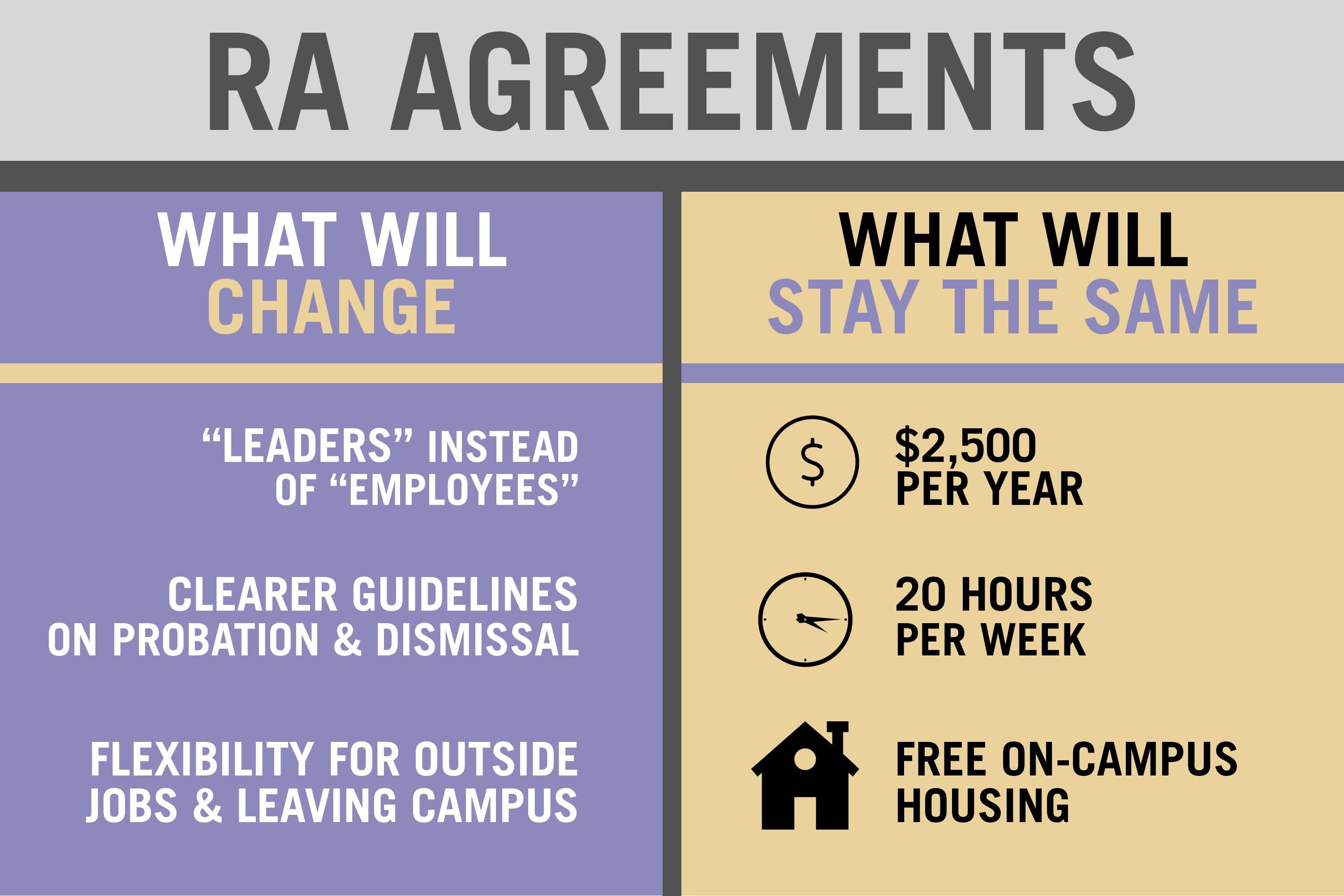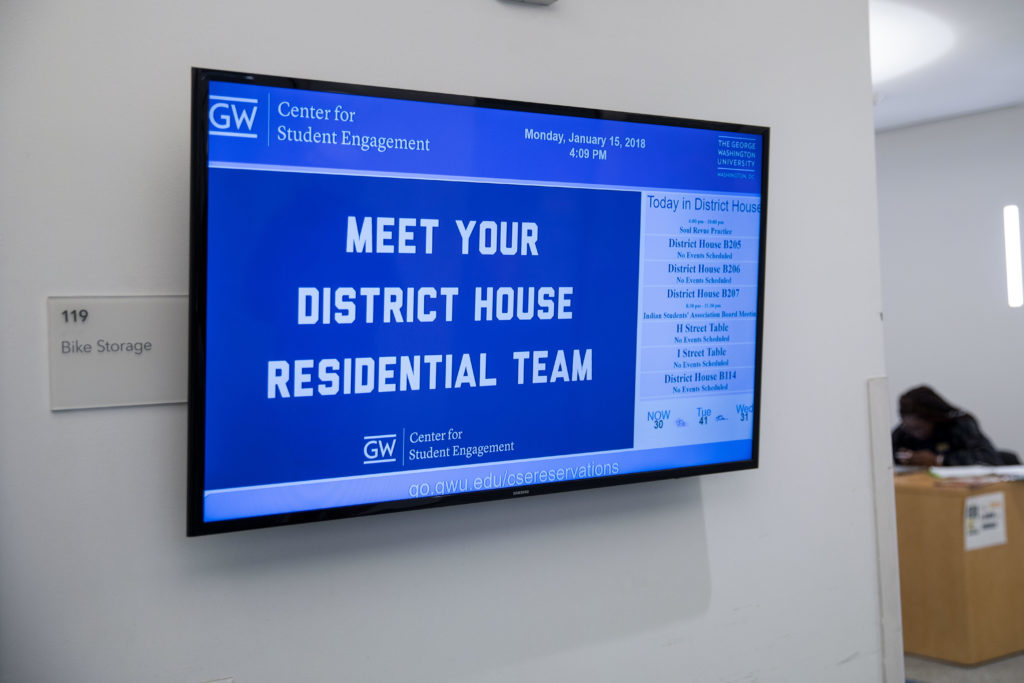After a controversial push from resident advisers to form a union last year, RAs will work under a new agreement starting this fall.
Officials in the Center for Student Engagement issued the new RA agreement in November, which no longer refers to RAs as “employees,” despite a federal ruling in April declaring that RAs are legal University workers with collective bargaining rights. RAs said the new agreement could be a tactic on the University’s behalf to prevent future unionization efforts after last year’s drive abruptly ended, but officials said the document is regularly updated to best reflect the RA role.

Olivia Dupree | Contributing Design Editor
Source: RA Agreements
The new deal also relaxes language about working hours and clarifies offenses that justify firing an RA.
Tim Miller, the associate dean of students, said the agreement was updated for the next academic year “to best represent the RA role to include our philosophy, the skills we hope RAs gain, expectations and important dates and deadlines.”
Differences in the documents
The new agreement, which was obtained by The Hatchet, clarifies vague aspects of the previous document, like unclear language about outside employment hours and general expectations of the role, according to five RAs familiar with the situation who spoke on the condition of anonymity because they were not authorized to speak about the agreement.
The agreement, sent to RAs in early November, is the first time the document has been substantially rewritten in about four years, three RAs said. During the 2015-16 school year, a new contract went into effect, lowering RA compensation from $4,750 to $2,500 a year, according to documents obtained by The Hatchet.
Miller declined to say when the new contract was drafted or who drafted it, but he said that RA expectations are updated “based on feedback from RAs” annually.
He declined to say what the most significant changes to the contract were, if the changes were made in response to last year’s unionization efforts and how the new document addresses concerns brought up during the push to unionize. He also declined to comment on how changes to the agreement allowing more leeway for outside work will affect RAs and whether the reaction to the new document has been primarily positive or negative.
“The RA role is an essential front line of our support for students and we will continue to work with these student leaders to ensure the quality of their learning experience as they provide support, guidance and mentorship to their residents,” Miller said in an email.
Last year, a group of current and former RAs pushed to unionize, citing concerns about compensation and vague language in their agreements with the University. Officials argued that the RAs worked as a part of their educational experience and weren’t employees.
The University brought the case in front of a national labor board, which ruled in April that the RAs could unionize in a precedent-setting decision.
The effort ended abruptly last May, when the union representing RAs unexpectedly canceled a planned vote on unionization the day before the election, surprising and confusing RA organizers. Had RAs voted to unionize, they would have been the first undergraduate student group to do so at a private university.
RAs and officials pointed to several new measures that were implemented this academic year or in the new agreement to address some previous concerns.
A senior RA on the Mount Vernon Campus said senior staff in the Center for Student Engagement moved the dates of monthly forums to Wednesday evenings, instead of Fridays. RAs previously complained that the Friday meetings prevented them from leaving campus for three-day weekends, the RA said.
Miller, the associate dean of students, said the forum change, in addition to “coffee hours” with CSE leadership, were two ways the University improved the RA program this academic year.
In the new deal, RAs can work with their supervisors to hold outside jobs for more than 10 hours a week or leave campus for more than three days, actions that were outlawed in the current document. A junior RA in Shenkman Hall said that in the past, the ability to have an outside job exceeding 10 hours a week or to leave campus for an extended period was largely at the discretion of each RA’s individual residential team.
RAs will still receive a stipend of $2,500 in installments every two weeks and free on-campus housing under the new agreement.
RAs react to the change
Several RAs voiced concerns over the change in language in the new program that no longer refers to RAs as “employees.”
Senior Calla Gilson, a former RA who spearheaded unionization efforts last year and sat through the NLRB hearing, condemned the elimination of the word “employee,” saying it “denigrates” the role.
“That title change does nothing to provide solutions to the issues that RAs continue to raise to administrators, and until those issues are taken seriously, I think the CSE can continue to expect disconnect from their employees who do not feel valued,” Gilson said in an email.
Kyle Waldman, an alumnus and former RA who opposed unionization, said he doesn’t have an issue with the change in title and that the new agreement does not alter “the functionality of the role.”
“Any meaningful changes to the RA position during the year are unlikely to stem from the new agreement, but rather other policy changes the CSE has the authority to make,” he said.
A female RA in JBKO who helped lead unionization efforts last year said that while she was “pretty disappointed” in the change in language about employees, the new document did address some concerns RAs voiced last year, like vague conditions for termination.
“A lot of times, people would do things and they wouldn’t know if that was reason enough for them to be terminated or not, and so they ended up giving us a very detailed outline about what we could do to be put on probation or terminated,” she said.
She said this academic year, CSE administrators have been more receptive to hearing RAs’ concerns, but worries about low compensation and poor mental health among RAs were not addressed in the new agreement.
Impact on future unionization efforts
The female RA in JBKO said a push for unionization in the near future is unlikely because last year’s efforts were “stressful” and “divisive” among RAs.
“Everyone who is currently an RA remembers this experience and remembers the outcome of the experience, and because of that, I really doubt that anyone would really be on board to tackle this again anytime in the near future,” she said.
Anne McLeer, the director of research and strategic planning at the SEIU Local 500, which was set to represent RAs last year before canceling the election, said the University no longer referring to RAs as employees will not affect students’ ability to launch future unionization efforts.
Still, McLeer said that because RAs exchange labor for compensation, they are employees.
“Employees understand that coming together to address concerns that they may have about their working conditions is a form of empowerment that is available to them,” she said. “And employees do that independent of what an employer thinks or says or does.”
Cayla Harris contributed reporting.





